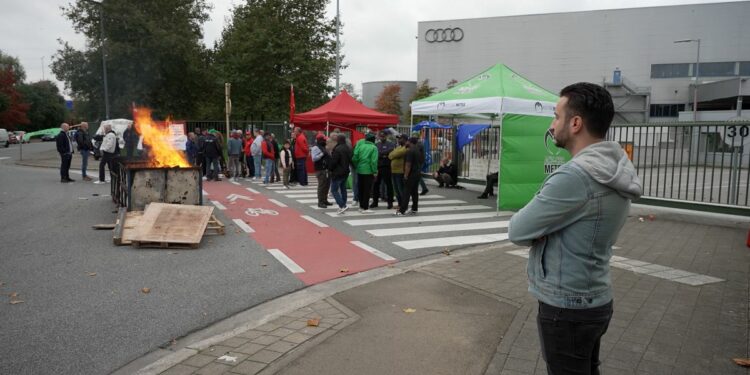This decision leaves 4,000 direct and indirect employees in a state of uncertainty, especially as no buyer has yet been found for the site.
But the closure of the Audi plant is not an isolated case in the European car industry, which has been hit hard by sluggish growth and increased competition from Chinese models. Since the start of 2024, there has been a steady stream of announcements about production cuts, redundancies and plant closures: Stellantis in Italy, Michelin in France, and above all Volkswagen in Germany, which is planning to close three production sites in its home country for the first time in its history.
This crisis in the automotive industry reflects a deeper problem that has been disrupting the European economy for decades: de-industrialisation. This term refers to the reduction in the share of industry in wealth creation in a country or region. In Europe, industry’s share of gross domestic product (GDP) fell from 28.8% in 1991 to 23.7% in 2023, a drop of almost 18% in thirty years, according to the World Bank.
Several factors explain this phenomenon, including automation, which reduces the demand for labour, and relocation to lower-cost countries.
The transition to a service economy, falling purchasing power, rising energy costs and increased competition from economies such as China and the United States are also weighing on European industry.
As a result, according to data compiled by the European Trade Union Institute, 853,000 industrial jobs will disappear in Europe between 2019 and 2023.
“I feel a sense of rebellion because I’m losing part of my future, but we’re not bankrupt,” Basil, who has worked on Audi’s production lines for 5 years, laments.
Like many of his colleagues, the thirty-year-old from Brussels is shocked that the closure has come at a time when Audi recorded an operating profit of almost 6.3 billion euros in 2023. “We don’t understand it; we think it’s unjust,” he adds, denouncing the sacrifice of employees in the name of profitability.
Faced with this phenomenon, Europe is trying to strengthen its industry by focusing on so-called ‘green’ technologies. The European Green Deal’s industrial plan aims to strengthen resource independence and promote companies investing in the energy transition. This plan is based on two pillars: one seeking to secure access to the metals needed for this transition, and the other, the ‘net zero’ industry regulation, supporting companies committed to carbon neutrality.
These are laudable objectives, according to Bertrand Candelon, Professor of International Finance at UCLouvain University, but they require massive investment.
“Mobilising 800 billion euros (as recommended in the report on European competitiveness by Mario Draghi, former President of the European Central Bank, editor’s note) is becoming a huge task. And given the current state of public finances, this will mainly benefit the large states that have the financial resources to invest in these carbon-neutral industries.”
Meanwhile, China and the United States continue to invest massively in their own industries, consolidating their position in international markets, including Europe.
According to Candelon, this race for industrial domination is becoming more and more like a trade war, increasing the pressure on Europe to catch up while pursuing its goal of carbon neutrality by 2050.
Source link : http://www.bing.com/news/apiclick.aspx?ref=FexRss&aid=&tid=673f6a7d623d499da044f936ea9b93d8&url=https%3A%2F%2Fwww.euronews.com%2Fmy-europe%2F2024%2F11%2F20%2Fclosure-of-audi-brussels-a-symbol-of-de-industrialisation-in-europe&c=10149722262778872099&mkt=de-de
Author :
Publish date : 2024-11-20 06:00:00
Copyright for syndicated content belongs to the linked Source.


